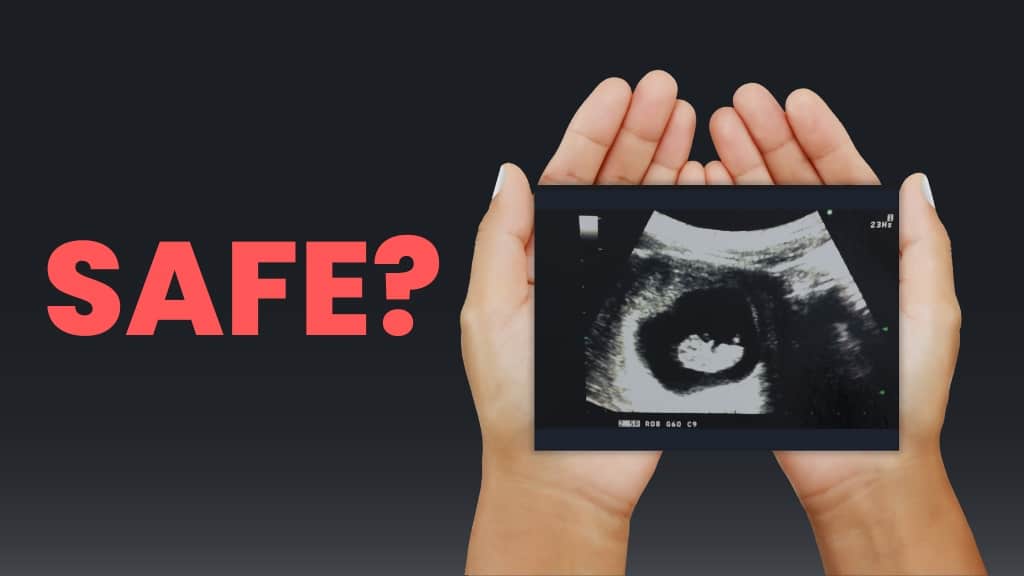
Table of Contents
Pregnant women have to get ultrasound scans twice during their 9-month journey. The first scan is done to confirm the pregnancy and the due date, i.e., at the beginning of the first trimester. The second one is scheduled at 18 to 22 weeks to confirm the baby’s sex and its normal anatomy.
There is no cause for concern about ultrasounds degrading your baby’s health. Even then it’s common to have misconceptions about ultrasound imaging during pregnancy. Are ultrasounds safe? Will I be affected by the ultrasound scans? How does ultrasound work? are some of the queries all parents have at one point in time. Here’s what expectant parents must know!
Working With an Ultrasound
Learning how ultrasound imaging works is the best way to ward off all misconceptions about it harming your unborn baby. In the 15 to 30-minute scan, a small transducer, usually called a probe, transmits high-frequency sound waves into the body by moving it around the abdomen or the vagina.
These waves travel and hit the boundaries between tissues (bone or fluid and soft tissues) and reflect the transducer. Based on the reflected waves’ amplitude (strength) and the time is taken by the wave to move through the body, an image of the fetus, called a sonogram, is produced.
There are two kinds of fetal diagnostic ultrasound scans:
- Transvaginal: Here the probe is placed on the mum’s vagina to send sound waves. It’s often used during early pregnancy and if the next type of ultrasound scan does not provide much information.
- Transabdominal: Here the probe is placed on the mum’s abdomen and moved about to get the images. This is the kind of ultrasound you would have had or would have generally.
If the medical professionals suspect a fetal abnormality they will use the following types of ultrasound to get more details:
- Specialized sonographic evaluation
- 3D ultrasound (detects neural tube defects or facial abnormalities)
- Doppler ultrasound (analysis of blood flow)
- Fetal echocardiography (detects congenital heart defects)
Are Ultrasounds Bad For The Baby?
Now addressing the elephant in the room, are ultrasounds bad for the baby? The American College of Obstetricians and Gynecologists (ACOG) and the U.S. Food and Drug Administration (FDA) say that there is no proven evidence of an ultrasound scan harming a developing fetus. The scans do not use x-rays or radiation which is why it is medically deemed safe.
BUT, scientists are skeptical about the non-medical use of ultrasound on a pregnant body. Their main concern is that the energy from the sound waves during a non-medical ultrasound can heat the growing baby’s tissues. Although it hasn’t been proven yet, you cannot rule out its possibility of being dangerous for the unborn child.
The Takeaway: Medically-supervised Ultrasound Imaging is The ONLY Safe Scanning
The answer to the hounding question “Are ultrasounds bad for the baby?” depends on who is performing the scan. This is because these scans are being offered even at your nearest mall and parents tend to agree with it to get a better picture of the baby. These technicians with unknown training use ultrasound of unknown calibration for an unknown period to get that picture. Unnecessary ultrasound scans can harm your child even if it hasn’t been proven. So, get a scan with a medical professional at a hospital or a reputed clinic only if you need it.
Are Ultrasounds Safe For Baby - FAQs
1. Why are ultrasounds not good for the baby?
2. Do ultrasounds have radiation?
3. How often can you use ultrasound?
4. Does exposure to ultrasound cause biological damage?
5. Is ultrasound harmful to the uterus?
Sources
On behalf of the editorial team at Parenthoodbliss, we follow strict reporting guidelines and only use credible sources, along with peer-reviewed studies, academic research institutions, and highly respected health organizations. To learn about how we maintain content accurate and up-to-date by reading our medical review and editorial policy.




